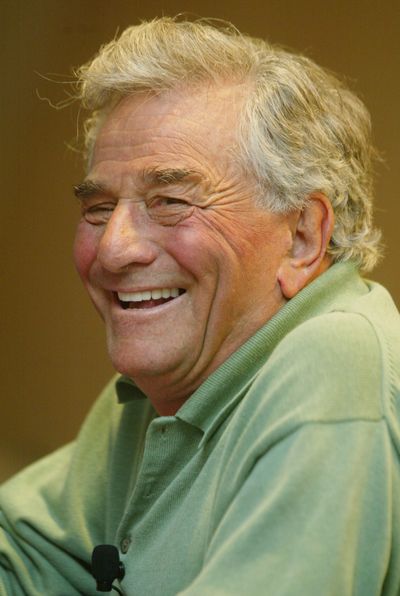Actor Peter Falk of ‘Columbo’ fame dies

LOS ANGELES — Peter Falk, the stage and movie actor who became identified as the squinty, rumpled detective in “Columbo,” which spanned 30 years in primetime television and established one of the most iconic characters in police work, has died. He was 83.
Falk died Thursday in his Beverly Hills home, according to a statement released Friday by family friend Larry Larson.
In a court document filed in December 2008, Falk’s daughter Catherine Falk said he was suffering from Alzheimer’s disease.
“Columbo” began its history in 1971 as part of the NBC Sunday Mystery Movie series, appearing every third week. The show became by far the most popular of the three mysteries, the others being “McCloud” and “McMillan and Wife.”
Falk was reportedly paid $250,000 a movie and could have made much more if he had accepted an offer to convert “Columbo” into a weekly series. He declined, reasoning that carrying a weekly detective series would be too great a burden.
Columbo — he never had a first name — presented a contrast to other TV detectives. “He looks like a flood victim,” Falk once said. “You feel sorry for him. He appears to be seeing nothing, but he’s seeing everything. Underneath his dishevelment, a good mind is at work.”
NBC canceled the three series in 1977. In 1989 ABC offered “Columbo” in a two-hour format usually appearing once or twice a season. The movies continued into the 21st century. “Columbo” appeared in 26 foreign countries and was a particular favorite in France and Iran.
Columbo’s trademark was an ancient raincoat Falk had once bought for himself. After 25 years on television, the coat became so tattered it had to be replaced.
Peter Michael Falk was born Sept. 16, 1927, in New York City and grew up in Ossining, N.Y., where his parents ran a clothing store. At 3 he had one eye removed because of cancer. “When something like that happens early,” he said in a 1963 Associated Press interview, “you learn to live with it. It became the joke of the neighborhood. If the umpire ruled me out on a bad call, I’d take the fake eye out and hand it to him.”
When Falk was starting as an actor in New York, an agent told him, “Of course, you won’t be able to work in movies or TV because of your eye.” Falk would later win two Oscar nominations (“Murder, Inc.,” 1960; “Pocketful of Miracles,” 1961) and collect five Emmys.
After serving as a cook in the merchant marine and receiving a master’s degree in public administration from Syracuse University, he worked as an efficiency expert for the budget bureau of the state of Connecticut. He also acted in amateur theater and was encouraged to become a professional by actress-teacher Eva La Gallienne.
An appearance in “The Iceman Cometh” off-Broadway led to other classical parts, notably as Joseph Stalin in “The Passion of Joseph D.” In 1971 Falk scored a hit in Neil Simon’s “The Prisoner of Second Avenue.”
Falk made his film debut in 1958 with “Wind Across the Everglades” and established himself as a talented character actor with his performance as the vicious killer Abe Reles in “Murder, Inc.” Among his other movies: “It’s a Mad, Mad, Mad, Mad World,” ”Robin and the Seven Hoods,” ”The Great Race,” ”Luv,” ”Castle Keep,” ”The Cheap Detective,” ”The Brinks Job,” ”The In-Laws,” ”The Princess Bride.”
Falk also appeared in a number of art house favorites, including the semi-improvisational films “Husbands” and “A Woman Under the Influence,” directed by his friend John Cassavetes, and Wim Wenders’ “Wings of Desire,” in which he played himself. Falk became prominent in television movies, beginning with his first Emmy for “The Price of Tomatoes” in 1961. His four other Emmys were for “Columbo.”
He was married to pianist Alyce Mayo in 1960; they had two daughters, Jackie and Catherine, and divorced in 1976. The following year he married actress Shera Danese. They filed for divorce twice and reconciled each time.
When not working, Falk spent time in the garage of his Beverly Hills home. He had converted it into a studio where he created charcoal drawings. He took up art in New York when he was in the Simon play and one day happened into the Art Students League.
He recalled: “I opened a door and there she was, a nude model, shoulders back, a light from above, buck-ass naked. The female body is awesome. Believe me, I signed up right away.”
Falk is survived by his wife Shera and his two daughters.